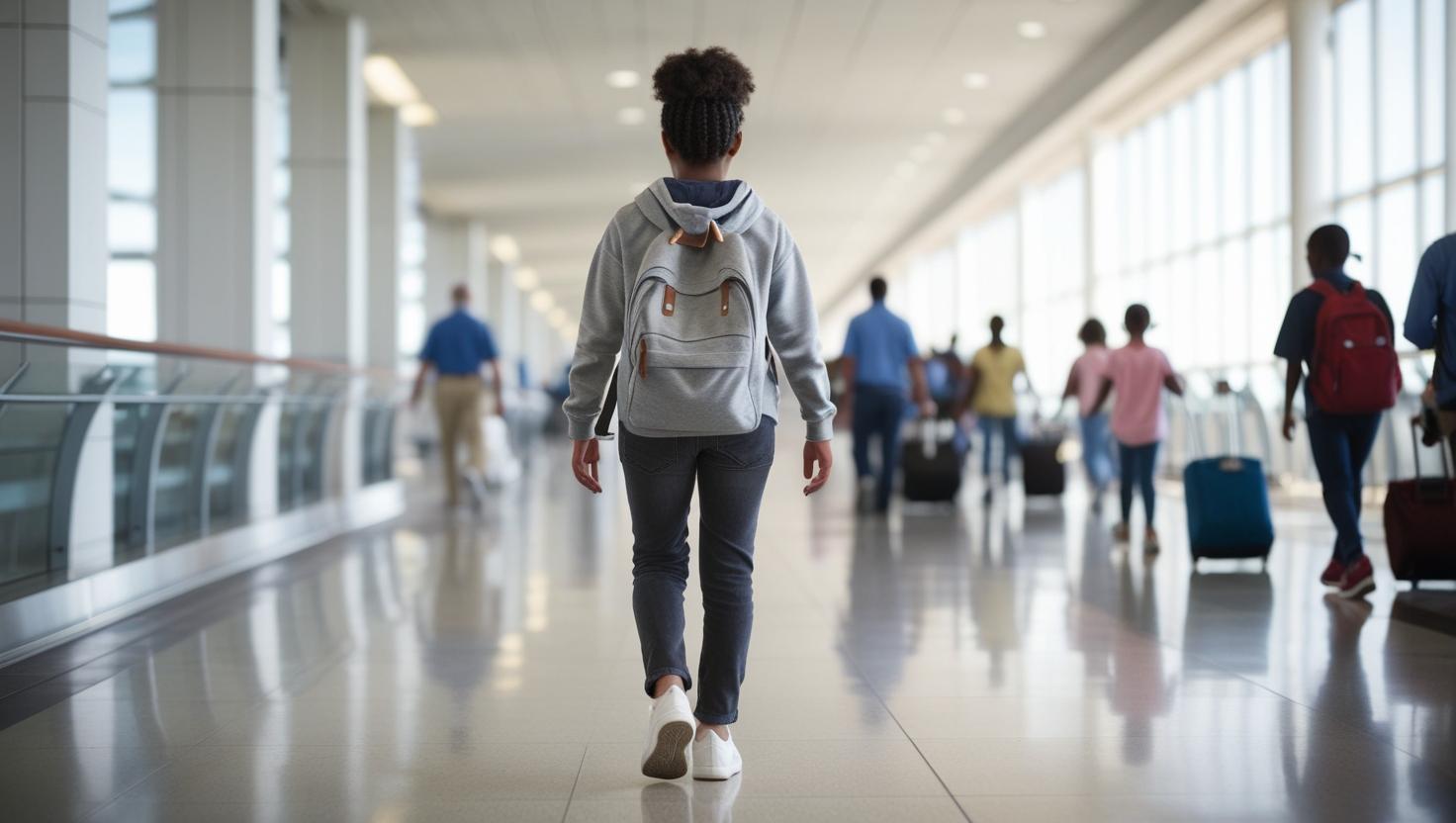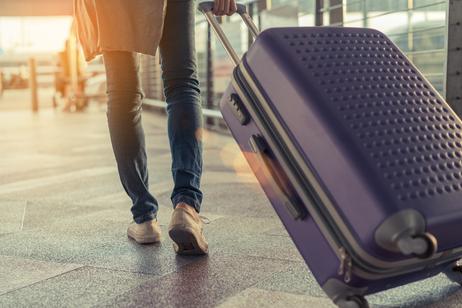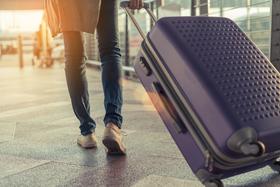How to Keep Teens Safe While Traveling Alone
Traveling in uncertain times is a challenge for most of us adults.So, imagine how many dangers, real and imagined, a young person will face when she travels alone.
Increased Anxiety: Teens may face heightened anxiety due to the uncertainty of travel conditions, such as changing health guidelines and travel restrictions.
Flight Cancellations and Disruptions: Flight cancellations and travel disruptions can be stressful for young travelers, requiring them to adapt quickly to new situations.
Be Streets Smart: Teens should be aware of their surroundings, avoid speaking to strangers, refrain from accepting items from unknown individuals, and maintain situational awareness to stay safe in unfamiliar places.
Technological and Digital Risks: With increased reliance on technology for travel, teens must also be aware of digital safety risks, such as online scams or data breaches, while traveling.
Canva generated this picture of a teen walking in an airport terminal corridor.

The young traveler
Whether you send your child off to visit her grandparents or send her back to school, you know she has to travel safely.
- After all, you have experienced just about every situation and glitch you can imagine during your travels.
- But remember that you were traveling as an adult.
- You had the financial resources to book a hotel room the minute the airline canceled your flight, and your flight out was early the following morning.
- You knew what to do to comply with TSA requirements as you made your way through airport security.
Most importantly, you were street-smart, aware of your surroundings, and ready with an exit path in case of a crisis.
- These are just a few of the things that you need to teach your children before they travel alone.
- David P., writing on Passportinfo.com, offers sound advice in his article Teens Traveling Alone – What You Need To Know.
Stay alert.
Since some passengers refuse to follow instructions, teach your child to monitor her surroundings constantly.
- You would think that would be a given, but teenagers can and do lose themselves in their worlds on their smartphones.
- They put their earbuds on and tune everything else out.
- So, teach her to be always situationally aware.
- Tell her to check her surroundings every couple of minutes.
- Use an app such as Life 360 to monitor her location.
Teach her to listen to announcements on the public address systems.
- Information about a gate change may not always be easy to understand; however, she might miss her flight if she doesn't hear that announcement.
- Show her how to monitor travel alerts on her smartphone.
- The airlines and travel services such as TripIt send alerts promptly. She needs to pay attention to her messages.
Staying alert also means not napping or falling asleep while sitting at the gate.
- Gate changes are common and tend to occur when we least expect them.
- Even more annoying is that airport acoustics can garble gate change announcements.
- Your child must stay alert while waiting to board her plane.
- Once she has boarded her plane, she can listen to her music uninterrupted, except for the safety announcements.
This video shows a teen's first flight without her parents.
Don't accept anything from anybody.
It's not a matter of being rude. It's a matter of being street-smart.
- Accepting anything from anybody can get your child in a whole heap of trouble.
- She cannot be naive. She has to be street-smart.
- If a stranger asks her to take a package, that's one thing.
- But what about somebody she knows who asks her to take something for her?
- If that package or object contains something illegal, she will end up in a detention room.
- As she goes through security, drugs, food, liquids, and much more will set off the alarms. You don't want that to happen.
- 12 Top Safety Tips for the International Traveler offers sound advice to share with your teen.
This video offers some tips for safety in airports.
Carry a credit card.
She needs a credit card for emergency use.
- You can monitor the card remotely.
- Show her when and how to use the card.
- In my opinion, credit cards are more flexible than debit cards.
- The other handy app is Cash App.
- Remind her to keep her credit cards and other valuable documents in concealed pockets.
- Teach her to use an ATM inside a bank or in a well-lit public area.
- How to Keep Your Money Safe While Traveling by Lauren Juliff offers tips worth sharing with your child.
Sit near the gate.
Gates at airports, bus terminals, and train stations are frequently crowded during peak travel times.
- However, your child must sit in the waiting area near the gate assigned for her trip.
- She could miss important announcements about flight delays and cancellations or documentation checks if she sits somewhere else.
- When she first arrives at the gate, coach her to approach the podium and have the agent confirm that her ticket is valid.
- It's better to find that out before she boards.
- Always smile and be polite. That just might get her upgraded.
- Smiles work wonders in the travel industry during these stressful times.
Clear security with TSA PreCheck.
Airport security can be a hassle for adults and young people alike.
- So, why not finesse that process by enrolling your child in TSA PreCheck or CLEAR?
- She'll go through security in shorter lines as a rule and avoid having to take off her shoes and outerwear most of the time.
- Review the TSA FAQ page for more information.
- Remind your teen that she will have to go through security when she arrives from a foreign country.
This video offers some tips for first-time flyers.
Transportation to and from airports.
If your child travels from her school at the end of a semester, the school will usually arrange well-organized shuttles to the area airports.
- Make sure that she schedules supervised transportation.
- The procedure works in reverse when she returns to school.
- If she misses the pre-arranged transportation, instruct her to hire an Uber or Lyft driver.
- In addition, remind her to share the trip details with you just in case something goes wrong.
- If she can take an Uber with another student from her school, that would be ideal.
Whenever your child's flight is delayed for more than 1 or 2 hours, contact the school and advise them of your child's arrival status. If the delay is significant or the flight has been canceled, inform the school as soon as you know so that the school can make alternative arrangements to pick up your child.
If bad weather shuts down local transportation such as Uber or Lyft, advise your daughter to go to a well-lit public area.
- Then, help her execute Plan B, which should be booking a hotel room for the night.
- Most airports will have a hotel on the premises or hotels very close by.
- As you plan your daughter's trip, review the availability of hotels at the arrival airport.
- When you know that the weather will make driving impossible, reserve a room for your child.
- Contact the hotel manager and explain the situation so that her staff is expecting your daughter.
- If you are a member of the hotel's frequent guest program, make them aware of it.
- In most cases, the hotel management will be helpful.
- Make sure your daughter has the hotel number and the reservation confirmation number on her smartphone.
Speaking of smartphones, equip your daughter with a portable charger and cables. Unfortunately, many airports don't have enough charging stations and outlets available to charge phones under the best of circumstances.
The last word
As the parent of two daughters and two sons, I have survived my children's travel experiences to and from school, to and from grandparents' homes, and so on.
- The worst moment came one summer when my eldest daughter was flying on a small prop plane from Hartford to Martha's Vineyard, where she had a summer job.
- So, you can imagine our reaction when the airline called and asked to speak with us. "Mr. and Mrs. Kennedy, your daughter's plane was struck by lightning. We had to bring the plane back to Hartford. She's ok."
- Well, we were not ok. We were shaking like leaves.
While most of my travel experiences with my children occurred before we had smartphones or even cell phones, the safe travel concepts outlined above remain the same.
- Think through your child's trip. Imagine everything that you know can go wrong.
- Plan for those inevitable curves that any travel plan will throw at you.
- When they happen, you and your child will know what to do.
- When everything goes smoothly, the trip will be a happy event. Trip planning is always your best insurance.
Questions? Contact us on Facebook, Instagram, and YouTube. @privateschoolreview
#TeenTravelSafety #TravelInUncertainTimes #StudentTravelAdvice #GlobalCitizenship #TeenTravelPrep





















